With hugs and tearful farewells, hundreds of student activists who have occupied the Legislative Yuan for 24 days walked out of the legislative chamber yesterday into a cheering crowd who gave them a heroes’ welcome.
“Leaving the legislature and retreating from the legislative chamber was a very difficult decision to make, because we know that the expectations, responsibilities and pressures we will face after leaving the legislature will not be lower,” student leader Lin Fei-fan (林飛帆) told the protesters on the legislative floor before asking all protesters to leave the room.
“I would like to stress that leaving here does not mean that we are giving up or backing down. In fact, this movement for democracy that began on March 18 is a continuation of Taiwan’s history of resistance and the quest for freedom that has been ongoing for more than 100 years. We will continue the history and we will never back down or give up,” he added.
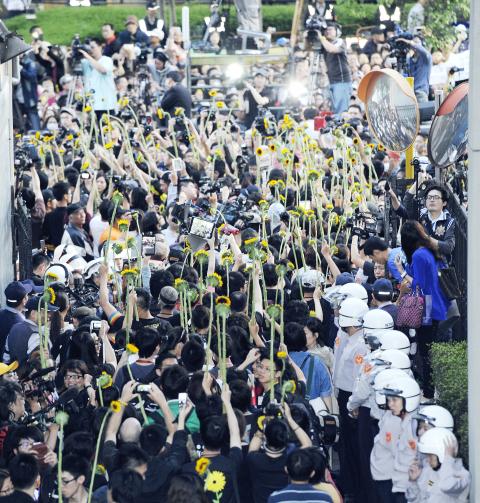
Photo: George Tsorng, Taipei Times
Lin said that after leaving the legislature, he and his partners planned to travel the country to connect with the approximately 500,000 people who took part in a demonstration on Ketagalan Boulevard in front of the Presidential Office Building on March 30.
“The 500,000 people are not just a number, and our next step is to go into different corners of the country to get to know these people,” Lin said. “The campaign is not over yet. We came with dreams in our minds and we leave with responsibilities on our shoulders.”
He also warned that if the Chinese Nationalist Party (KMT) broke the promise by Legislative Speaker Wang Jin-pyng (王金平) — to adopt legislation to monitor cross-strait agreements before reviewing the cross-strait service trade agreement — a bigger protest would be mobilized.
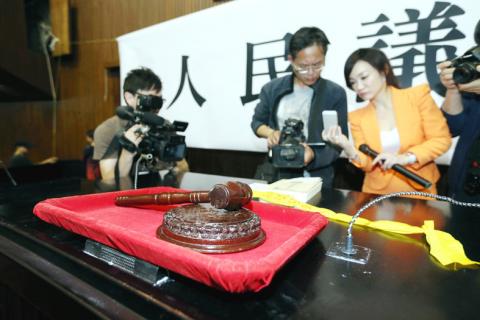
Photo: Chang Chia-ming, Taipei Times
“Occupation of the Legislative Yuan is only the preface to our action, the first chapter will soon start within civil society,” Lin said. “We will be back, we definitely will.”
“We will definitely meet again,” a group of students told each other as they hugged before leaving the legislative chamber, while others were busy cleaning up and restoring the chamber to its original state.
Another student leader, Chen Wei-ting (陳為廷), thanked all those who took part in the movement, regardless of their age, profession or background, while dismissing the media’s naming of the movement as a “student movement.”
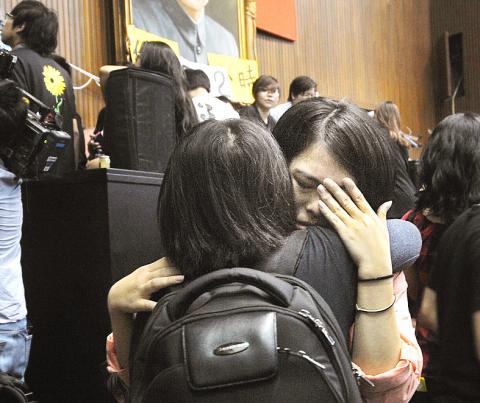
Photo: Fang Pin-chao, Taipei Times
“From the very beginning, this movement has not been a ‘student movement,’ as many people who are not in the movement define it. It is a movement that involves all citizens of this country, as well as many foreign residents living in Taiwan and Taiwanese living overseas,” Chen said.
He thanked medical personnel, lawyers and members of other civic groups, notably the Alliance of Referendum for Taiwan, for their support and help.
While many people made a distinction between protesters at the Legislative Yuan and those who once besieged the Executive Yuan on March 23, Chen said that those activists are also their partners and that the violent crackdown by the police against those people should be remembered.
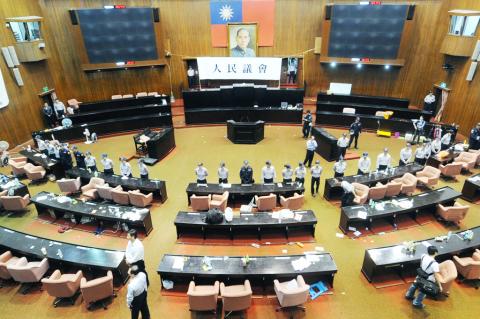
Photo: Lo Pei-der, Taipei Times
Besides clearing all the posters, slogans, banners, medical equipment, food and water from the legislative chamber and removing piles of chairs that blocked the chamber’s entrance, the students also returned the speaker’s gavel and placed it on the table in front of the speaker’s seat before leaving.
“Doing so is a symbolic gesture that we are now returning the legislative chamber to lawmakers,” a student said. “We hope that our lawmakers will, from now on, keep what the people want in their minds while formulating legislation.”
The students also left a classical satirical work, The Bureaucracy Exposed (官場現形記), on the table, with a note urging the legislature to adopt the promised monitoring legislation before reviewing the cross-strait trade pact and refrain from listening to President Ma Ying-jeou (馬英九), but listen to the public instead.
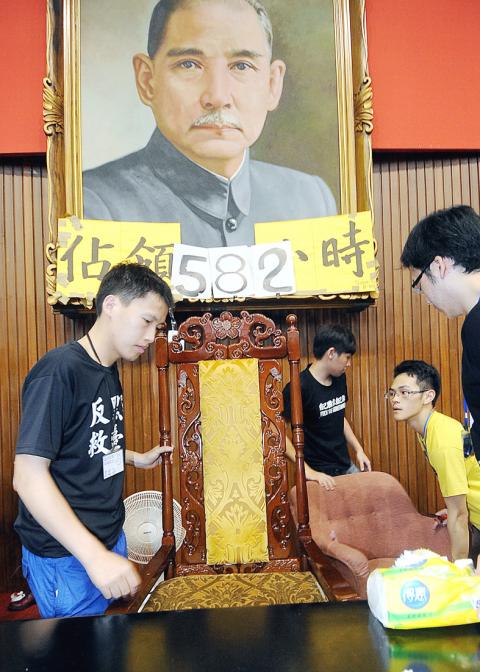
Photo: Fang Pin-chao, Taipei Times
Originally scheduled to deliver a speech, Lin and Chen left the rally before it ended at about 8:30pm.
After the rally, some still refused to leave, and as of press time, several civic groups, including the Alliance of Referendum for Taiwan, were still rallying outside the legislature, saying that they would wait to be evicted by police.
Meanwhile, shortly after the students’ departure from the Legislative Yuan, the National Police Agency ordered forensic investigators from the Taipei City Police Department’s Forensic Science Center to collect fingerprints from the legislative chamber.
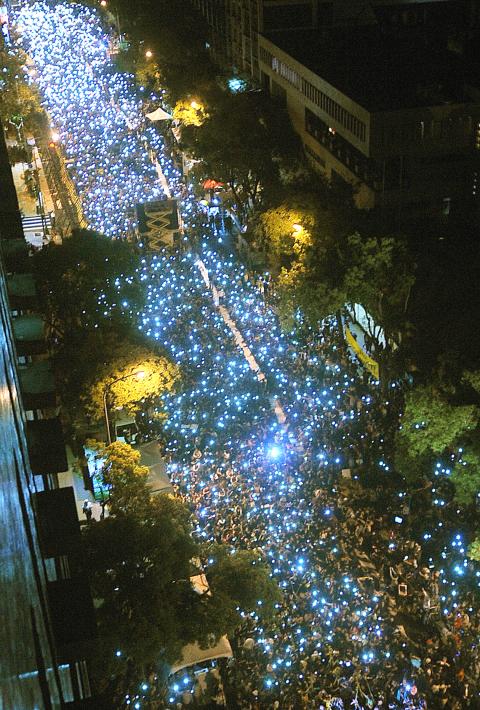
Photo: Fang Pin-chao, Taipei Times
The agency also dispatched police officers from the Special Police Sixth Headquarters to surround and take over the legislature.
The move has raised speculations that the government might be planning to take legal action against the students.
Additional reporting by Chen Hsiao-yi

NATIONAL SECURITY THREAT: An official said that Guan Guan’s comments had gone beyond the threshold of free speech, as she advocated for the destruction of the ROC China-born media influencer Guan Guan’s (關關) residency permit has been revoked for repeatedly posting pro-China content that threatens national security, the National Immigration Agency said yesterday. Guan Guan has said many controversial things in her videos posted to Douyin (抖音), including “the red flag will soon be painted all over Taiwan” and “Taiwan is an inseparable part of China,” while expressing hope for expedited “reunification.” The agency received multiple reports alleging that Guan Guan had advocated for armed reunification last year. After investigating, the agency last month issued a notice requiring her to appear and account for her actions. Guan Guan appeared as required,

Japan and the Philippines yesterday signed a defense pact that would allow the tax-free provision of ammunition, fuel, food and other necessities when their forces stage joint training to boost deterrence against China’s growing aggression in the region and to bolster their preparation for natural disasters. Japan has faced increasing political, trade and security tensions with China, which was angered by Japanese Prime Minister Sanae Takaichi’s remark that a Chinese attack on Taiwan would be a survival-threatening situation for Japan, triggering a military response. Japan and the Philippines have also had separate territorial conflicts with Beijing in the East and South China

A strong cold air mass is expected to arrive tonight, bringing a change in weather and a drop in temperature, the Central Weather Administration (CWA) said. The coldest time would be early on Thursday morning, with temperatures in some areas dipping as low as 8°C, it said. Daytime highs yesterday were 22°C to 24°C in northern and eastern Taiwan, and about 25°C to 28°C in the central and southern regions, it said. However, nighttime lows would dip to about 15°C to 16°C in central and northern Taiwan as well as the northeast, and 17°C to 19°C elsewhere, it said. Tropical Storm Nokaen, currently

PAPERS, PLEASE: The gang exploited the high value of the passports, selling them at inflated prices to Chinese buyers, who would treat them as ‘invisibility cloaks’ The Yilan District Court has handed four members of a syndicate prison terms ranging from one year and two months to two years and two months for their involvement in a scheme to purchase Taiwanese passports and resell them abroad at a massive markup. A Chinese human smuggling syndicate purchased Taiwanese passports through local criminal networks, exploiting the passports’ visa-free travel privileges to turn a profit of more than 20 times the original price, the court said. Such criminal organizations enable people to impersonate Taiwanese when entering and exiting Taiwan and other countries, undermining social order and the credibility of the nation’s